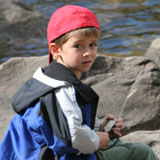 Homesickness is common among children who attend overnight (resident) camps and usually isn’t a cause for concern.
Homesickness is common among children who attend overnight (resident) camps and usually isn’t a cause for concern.
However, you can help prepare your child for overnight camp and reduce the likelihood of homesickness with the following simple steps:
• Schedule sleepovers at the houses of friends and family members in the months leading up to camp to help your child get use to being away from home.
• Register your child for a overnight camp she really wants to attend. She’ll be less likely to become homesick if she’s engaged with camp activities.
• Familiarize your child with the camp he’ll be attending. If possible, visit the camp in advance. If this isn’t possible, review the camp’s web site or brochure with your child.
• Role play common camp situations that may be unfamiliar to your child, such as walking outside with a flashlight, sleeping in a sleeping bag, eating at a cafeteria, etc.
• Have your child attend overnight camp with a friend. A familiar face can reduce the anxiety of being away from home.
• Have your child select and pack a favorite personal item, such as a small toy or stuffed animal.
• Send a note or small care package to camp ahead of time to welcome your child to camp. Acknowledge that you’ll miss her, but assure her that she’ll have a great time.
• Avoid reminders of home. Frequent calls and personal notes or family photos tucked in every shirt can remind your child that he misses his family and home. Determine how and when you’ll contact each other. Some camps have a no-call policy, because calls to or from family distract children from the camp experience and increase homesickness.
If your child wants to leave camp early, don’t rush to his rescue. Instead, encourage your child to stay at camp for another day. Most homesickness will pass and your child will gain confidence and resilience by working through this difficulty.
If you’re concerned about your child, talk with the camp leader to determine whether or not your child’s behavior is within the norm. If your child doesn’t adjust to overnight camp in a few days, isn’t sleeping or eating, isn’t interacting with campers or participating in activities, or seems anxious or depressed then you should bring him home. Don’t make your child feel bad about not completing camp. Acknowledge that overnight camp is a big step and encourage him to give it another try next year.
You may find that you get childsick while your children are away at camp, especially if all your children are away at the same time. This isn’t surprising given how bonded you are with your children and how much your daily routine probably revolves around them.
To help you get through their absence, make a list of projects you’d like to work on, such as gardening, organizing photos, or cleaning your closet. Catch up with friends and enjoy dinners that your kids won’t eat. Stock up on books and magazines you don’t usually have time to read.
When you write to or talk with your children at camp, it’s fine to let them know you miss them and look forward to their return. Just don’t act sad or lost or you’ll cause them to worry and feel guilty. Instead, keep the focus on them and their camp experiences.